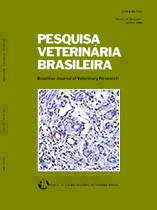 |
|
|
|
Year 2015 - Volume 35, Number 9
|

|
Estrogen and interferon γ influence on 2, 3 indoleamine-dioxygenase expression in culture of placenta and fetal cells from Wistar rats, 35(9):795-800
|
ABSTRACT.- Salvadori M.L.B., Bianchi P.K.F.C, Liphaus B.L., Souza E.Z., Silva R.S. & Kfoury Júnior J.R. 2015. [Estrogen and interferon γ influence on 2, 3 indoleamine-dioxygenase expression in culture of placenta and fetal cells from Wistar rats.] Influência do estrógeno e do interferon γ sobre a expressão da indoleamina-2,3-dioxigenase em cultura de células de placenta e embriões de ratas Wistar. Pesquisa Veterinária Brasileira 35(9):795-800. Setor de Anatomia, Departamento de Cirurgia, Faculdade de Medicina Veterinária e Zootecnia, Universidade de São Paulo, Av. Prof. Dr. Orlando Marques Paiva 87, Butantã, São Paulo, SP 05508-270, Brazil. E-mail: jrobertok@usp.br
The indoleamine 2,3-dioxygenase (IDO) is an enzyme responsible for catabolizing the tryptophan. Its presence in the placental uterine environment is related to immunological tolerance to the semi-allograft because it prevents proliferation of maternal immune cells, either by the lack of this amino acid or by the action of its catabolites, such as the quinolinic acid, which is particularly toxic for T lymphocytes. Little is known regarding the influence of hormones and cytokines on the expression of IDO in the maternal fetal interface. Therefore, the hypothesis that some hormones and interleukins present in uteroplacental region could have an effect on the expression of IDO on cultured cells was tested. Cells derived from the fetal maternal interface from Wistar rats were kept in culture and supplemented with estradiol and interferon-γ. Expression of the enzyme was assessed by flow cytometry at periods of 4, 24 and 48 hours and confirmation of the presence of protein by immunohistochemistry. The results showed an increasing of IDO expression after the addition of estrogen (9.03±0.81 to 11.25±0.25) and interferon-γ (9.03±0.81 to 20.43±0.60). The effect of interferon-γ was expected as reported in the literature, however, elevated IDO expression by estrogen represents new information on possible mechanisms involved in the enzyme activation. These findings could provide a better understanding of IDO contribution on maternal-fetal tolerance and may collaborate to future therapeutic modulation of this enzyme |
| |
|
|
| |
|
 |